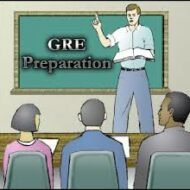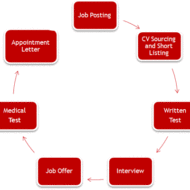Posted by Managementguru in Glossary, Human Resource
on Dec 3rd, 2014 | 0 comments

This HR Glossary pertains to ‘A’ series terminologies Ability Aptitude or competence, the skill or proficiency needed to perform certain tasks. Ability test An assessment instrument used to measure an individual’s abilities, mental or physical skills level (i.e. problem solving, manual dexterity, etc.). Absenteeism Referred to as the habitual failure of employees to report for work when they are scheduled to work. Absolute ratings A rating method where the rater assigns a specific value on a fixed scale to the behavior or performance of an individual instead of assigning ratings based on comparisons between other individuals. Abstract reasoning The process of perceiving issues and reaching conclusions through the use of symbols or generalizations rather than concrete factual information. Acceptance theory of Authority A manager’s authority rests on his or her subordinate’s acceptance of his or her right to give orders and to expect subordinate’s compliance with them. Accessibility The extent to which a contractor’s or employer’s facility is readily approachable and does not inhibit the mobility of individuals with disabilities, particularly such areas as the personnel office, worksite and public areas. Accessible format Materials that are designed in alternate formats such as Braille, audiotape, oral presentation or electronically for individuals with visual impairments. Accident and Health Benefits Employee fringe benefits paid usually through employer funded insurance plans. Accountability The responsibility placed on an individual or group for their own or others’ actions, conduct, performance, projects, etc. Accreditation A process of external quality review and certification by a recognized body that evaluates individuals, colleges, universities and educational programs to assure they are performing the functions that they claim to be performing in a competent manner. Achievement test A standardized testing instrument used to measure how much an individual has learned or what skills he or she has attained as a result of education, training or past experience. Acquisition The process of acquiring control of another corporation by purchase or stock exchange. Action learning A learner-driven, continuous learning process where learning revolves around the need to find solutions to real problems. Active learning The process of learning new knowledge, skills and behaviors through taking specific actions or performing specific tasks. Active listening A manner of listening that focuses exclusively on what the other person is saying and validates understanding of both the content of the message and the emotions underlying the message to ensure exact understanding. Activities of daily living (ADL) The personal care activities which are essential to an individual’s everyday living, including eating, bathing, grooming, dressing, mobility and toileting. Action-centered Leadership A theory of leadership which focuses on what leaders actually have to do in order to be effective,rather than on the personal qualities that they need to be good leaders, and which believes that leadership can be taught. Adjunct program A supplemental training tool that applies programming principles to existing instructional modules, materials, texts, manuals, etc., that are designed to direct the learner to specific areas within the module. Adjudicator: Aa person who gives a decision on a problem, an adjudicator in an industrial dispute. Administrative service organization (ASO) A term used to define an organization that provides outsourced solutions to meet the administrative and HR needs of the client with the client retaining all employment-related risks and liabilities. Administartive Officer Office employee responsible for managing the office, running errands and assisting the executive or boss, typing, filing, and other office related duties as required by the specific job. Adverse action Any act by an employer that results in an individual or group of individuals being deprived of equal employment opportunities. Adverse impact A substantially different rate of selection in hiring, promotion or other employment decision that works...

Posted by Managementguru in E Sale Point
on May 2nd, 2014 | 0 comments

This PDF on GRE verbal / vocabulary enlightens you with almost all ‘A’ series words covered. Given in the form of posters for your easy understanding and practice, it will definitely serve as a ready reckoner whenever needed. Planning to release the next PDF on ‘B’ series again with the complete list of words that’ve appeared in the past GRE papers. Lilting tips to crack GRE verbal… Learning Vocabulary can be Fun – Your vocabulary is absolutely vital to mastering the verbal section of the GRE test. One part of this will include the Sentence Completion section, which makes up about a quarter of your overall score. You also improve GRE vocabulary through talking. When you talk to somebody your mind is more alert than when you are studying alone. That is because you are using two senses instead of one. FOLLOW THIS LINK TO BUY THE INEVITABLE GUIDE AND CRACK GRE GRE Vocabulary Guide – Top 120 Words in ‘A’...

Posted by Managementguru in Human Resource, Labor Management, Training & Development
on Mar 9th, 2014 | 0 comments

HR Selection Process and Techniques Following the process of recruitment is selection, where the management has to select the right employees at the right time. The intention is to choose appropriate candidates for the unfilled spots and to avoid commitments to those whom the management thinks will not work well. The best qualified individuals from the pool find their place whose qualifications match the job specifications. What is the Selection Process in Human Resource Management? Selection process depends upon the · Size of the company · Nature of the business · Kind and Number of persons to be employed · Government regulations to be followed etc. The process includes 1. Collection of data about the candidate’s qualification 2. Experience 3. Physical and mental ability 4. Nature and Behavior 5. Aptitude and the like Steps in Scientific Selection Process: A. Job Analysis: This is the basic step for finding the right candidate and each organization should lay down job analysis, job description and job specification with clarity in order to lure the right candidates for selection. B. Recruitment: Process of searching for prospective employees and stimulating them to apply for jobs in the organization. C. Application Form: This is also known as the application blank. This facilitates collecting detailed information from the prospective employees regarding their age, gender, family details, qualification, skills, experience, achievements etc. This is widely used to screen employees at the preliminary level. D. Written Examinations: are conducted to gauge the · Mathematical ability · Aptitude · Reasoning · Knowledge in various disciplines · General Knowledge and · English language abilities of the candidates. E. Preliminary Interview: This is suitable to eliminate the undesirable and unsuitable candidates and also to gather personal information from the candidates on a one to one basis. F. Group Discussion: Group discussions help the management to pick out bright candidates from among the group members and also the ability of each individual to adjust to the group. Each group is expected to analyze, interpret and find alternate solutions and select the best solution for a particular case study or subject matter. G. Tests: To further assess the skills of the employees the management conducts different kinds of tests. H. Final Interview: This is the most essential step in the process of selection. The interviewer matches the information obtained about the candidate through the application with that of his own observation and questioning. · Informal · Formal · Planned · Patterned · Non-Directive · Depth · Stress · Group and · Panel interviews are some of the types of interviews conducted in accordance with the job requirement. Also See: Interview Preparation Tips I. Medical Examination: Certain jobs require certain physical qualities like clear vision, perfect hearing, unusual stamina, tolerance of hard working conditions, clear tone etc. J. Reference Checks: The personnel department will engage in checking reference if the candidate passes all the tests and found suitable for the job. What kind of Companies the Employees are Attracted to – Here is an interesting infographic on “How to Attract the Perfect Employee”...






